
-
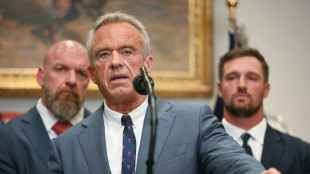 US health chief based vaccine cuts on misinformation, researchers say
US health chief based vaccine cuts on misinformation, researchers say
-
US astronaut Jim Lovell, commander of imperiled Apollo 13, dead at 97

-
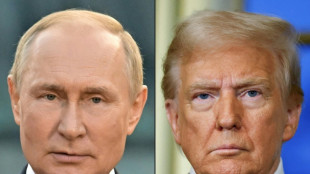 Trump says will meet with Putin 'very shortly'
Trump says will meet with Putin 'very shortly'
-
Barcelona reinstate Ter Stegen as captain

-
 Fleetwood leads St. Jude in search of first US PGA Tour title
Fleetwood leads St. Jude in search of first US PGA Tour title
-
Gold futures hit record on US tariff shock; mixed day for stocks

-
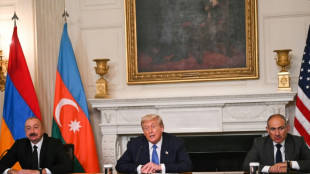 Trump says Armenia, Azerbaijan committed to end fighting 'forever'
Trump says Armenia, Azerbaijan committed to end fighting 'forever'
-
England's injured Woakes still has Ashes hopes

-
 US astronaut Jim Lovell, Apollo 13 commander, dead at 97
US astronaut Jim Lovell, Apollo 13 commander, dead at 97
-
Swiss gold refining sector stung by US tariffs
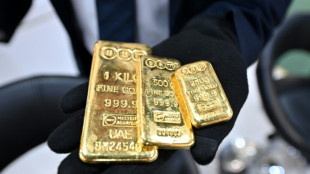
-
 New Instagram location sharing feature sparks privacy fears
New Instagram location sharing feature sparks privacy fears
-
Spain's Badosa withdraws from US Open

-
 Mexico seeks compensation from Adidas in cultural appropriation row
Mexico seeks compensation from Adidas in cultural appropriation row
-
NBA Celtics sign Mazzulla to coaching contract extension

-
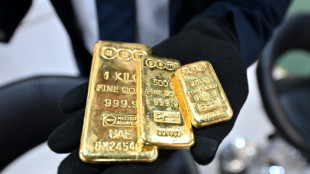 Swiss gold refining sector hits US tariff mine
Swiss gold refining sector hits US tariff mine
-
Ter Stegen responds after Barcelona strips him of captaincy

-
 Chelsea's Broja joins Burnley on five-year deal
Chelsea's Broja joins Burnley on five-year deal
-
Three centurions as 'ruthless' New Zealand pile on runs against Zimbabwe

-
 Three die in Greece as gales stoke fires, disrupt ferries
Three die in Greece as gales stoke fires, disrupt ferries
-
ICC unseals Libya war crimes warrant for militia officer

-
 Montreal protagonists Mboko, Osaka out of Cincinnati Open
Montreal protagonists Mboko, Osaka out of Cincinnati Open
-
Trump says court halt of tariffs would cause 'Great Depression'
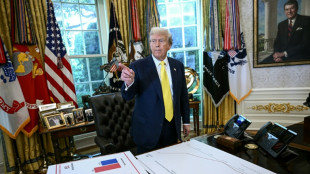
-
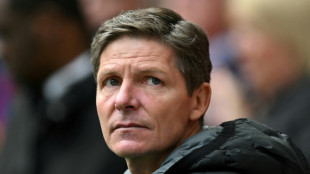 Glasner says demotion to Conference League would punish 'innocent' Palace
Glasner says demotion to Conference League would punish 'innocent' Palace
-
New Zealand build big total in 2nd Test against Zimbabwe

-
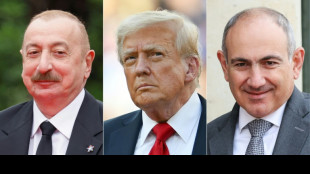 Trump hosts foes Armenia, Azerbaijan in his latest peace initiative
Trump hosts foes Armenia, Azerbaijan in his latest peace initiative
-
Nigerian scientists await return of Egusi seeds sent to space

-
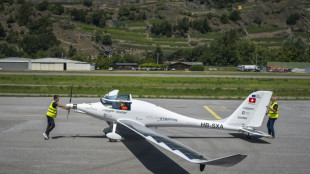 Pioneer spirit drives Swiss solar-powered plane altitude attempt
Pioneer spirit drives Swiss solar-powered plane altitude attempt
-
Thyssenkrupp to spin off marine division amid defence boom
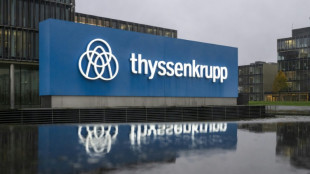
-
 Vance and Lammy talk Gaza, fish as US VP starts UK holiday
Vance and Lammy talk Gaza, fish as US VP starts UK holiday
-
Israel plans to 'take control' of Gaza City, sparking wave of criticism

-
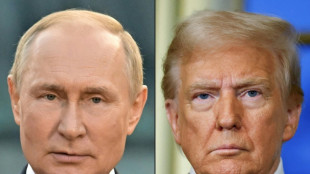 Putin taps key allies ahead of Trump summit, sanctions deadline
Putin taps key allies ahead of Trump summit, sanctions deadline
-
Two tourists die, fires erupt in Greece amid gale-force winds

-
 Lens sign France international Thauvin from Udinese
Lens sign France international Thauvin from Udinese
-
Gold futures hit record on US tariff shock, stocks wobble

-
 Man Utd training ground upgrade will foster 'winning culture': Ratcliffe
Man Utd training ground upgrade will foster 'winning culture': Ratcliffe
-
Two tourists die at sea in Greece amid gale-force winds

-
 'Optimistic': Champagne growers hope for US tariff shift
'Optimistic': Champagne growers hope for US tariff shift
-
French firefighters optimistic after controlling vast wildfire

-
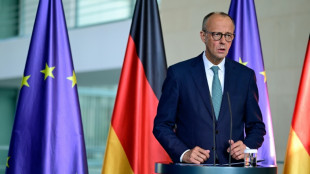 Germany suspends arms exports to Israel for use in Gaza
Germany suspends arms exports to Israel for use in Gaza
-
Stocks waver, gold futures hit record on US tariff updates

-
 Guessand says he jumped at chance to join Aston Villa after sealing move
Guessand says he jumped at chance to join Aston Villa after sealing move
-
Israel to 'take control' of Gaza City, sparking wave of criticism

-
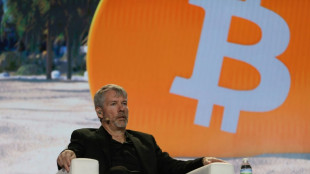 Accumulating bitcoin a risky digital rush by companies?
Accumulating bitcoin a risky digital rush by companies?
-
Liverpool's Slot hints at fresh Isak bid despite 'attacking power'

-
 PSG to sign Lille goalkeeper Lucas Chevalier: source
PSG to sign Lille goalkeeper Lucas Chevalier: source
-
Oil industry presence surges at UN plastic talks: NGOs
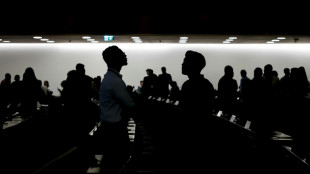
-
 Kipyegon says a woman will run a sub-four minute mile
Kipyegon says a woman will run a sub-four minute mile
-
Tokyo soars on trade deal relief as most Asian markets limp into weekend
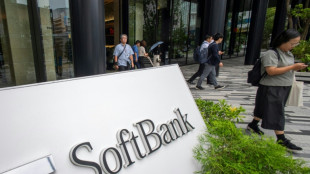
-
 Israel to 'take control' of Gaza City after approving new war plan
Israel to 'take control' of Gaza City after approving new war plan
-
Australian A-League side Western United stripped of licence

| RBGPF | -5.79% | 71.84 | $ | |
| BCC | -1.34% | 82.09 | $ | |
| RYCEF | -0.7% | 14.35 | $ | |
| CMSC | 0.39% | 23.05 | $ | |
| SCS | -0.76% | 15.88 | $ | |
| GSK | 0.58% | 37.8 | $ | |
| NGG | -1.51% | 71.01 | $ | |
| BTI | 0.96% | 57.24 | $ | |
| RIO | 1.76% | 61.86 | $ | |
| BCE | 2.34% | 24.35 | $ | |
| JRI | 0.19% | 13.435 | $ | |
| SCU | 0% | 12.72 | $ | |
| RELX | -2.2% | 48 | $ | |
| VOD | 0.88% | 11.36 | $ | |
| AZN | -0.69% | 73.55 | $ | |
| BP | -0.15% | 34.14 | $ | |
| CMSD | 0.25% | 23.58 | $ |

German growth better than expected but tariff turmoil looms
Germany's struggling economy grew faster than expected at the start of the year, data showed Wednesday, in a boost for the incoming government of conservative Friedrich Merz even as US tariffs threaten to derail the nascent recovery.
Gross domestic product (GDP) in Europe's biggest economy expanded 0.2 percent from January to March compared to the previous quarter, according to provisional figures from federal statistics agency Destatis.
The expansion, driven by improving consumption and investment, was better than analyst forecasts and meant Germany dodged a recession -- defined as two straight quarters of negative growth -- after a contraction at the end of last year.
It was rare good news for the eurozone's traditional growth engine which has been battling a manufacturing slowdown, rising costs and weak demand in key overseas markets, prompting the economy to shrink in both 2024 and 2023.
The improving picture will come as a relief for incoming chancellor Merz as he prepares to take office next week, with the dire state of the economy one of his most pressing challenges.
Still, any celebrations are likely to be short-lived, with economists predicting that Germany will be hit hard later in the year by US President Donald Trump's tariff blitz.
"This should not be interpreted as the beginning of a sustainable recovery," said Dirk Schumacher, chief economist at German public lender KfW, warning of "uncertainty regarding American economic policy".
The Ifo institute said that the economy likely benefited in the first quarter as companies in the United States -- Germany's top trading partner last year -- rushed to import goods before tariffs kicked in this month, and the levies would weigh on growth later in 2025.
The European Union is currently facing a 10-percent tariff on its exports to the United States as part of Trump's hardball trade agenda. He earlier announced a 20-percent rate on the bloc but then paused the higher levies -- on the EU and many other trading partners -- to allow for talks.
- Deep-rooted problems -
In a further sign of economic weakness for Germany, data released Wednesday showed unemployment edging up to 6.3 percent in April -- the second straight monthly increase.
Following two years of contraction driven by surging energy prices after Russia invaded Ukraine and post-pandemic supply chain woes, the German economy was expected to start making a modest recovery this year.
But the government last week downgraded its growth forecast for 2025 to zero, blaming Trump's sweeping tariffs, in line with economic institutes who have also been slashing their estimates.
Highlighting the economy's woes, Volkswagen and Mercedes-Benz -- two major players in Germany's flagship auto industry -- reported sharp falls in first-quarter profits Wednesday, and warned of the impact of US tariffs.
Merz has vowed a barrage of measures to boost the economy, ranging from vastly increasing public spending to lowering corporate taxes and energy costs.
He has already succeeded in leading efforts to push changes to Germany's restrictive debt rules through parliament, paving the way for massive extra outlays on defence and infrastructure, which economists say should boost the economy.
But it is expected to take some time before these measures are implemented and have any kind of impact.
And ING economist Carsten Brzeski warned the spending plans, "impressive as they might be, will do very little to improve the economy's competitiveness".
"Modern infrastructure is essential for one of the world's largest economies, but it doesn't inherently drive innovation, sector transformation, or new growth opportunities."
F.AbuZaid--SF-PST
